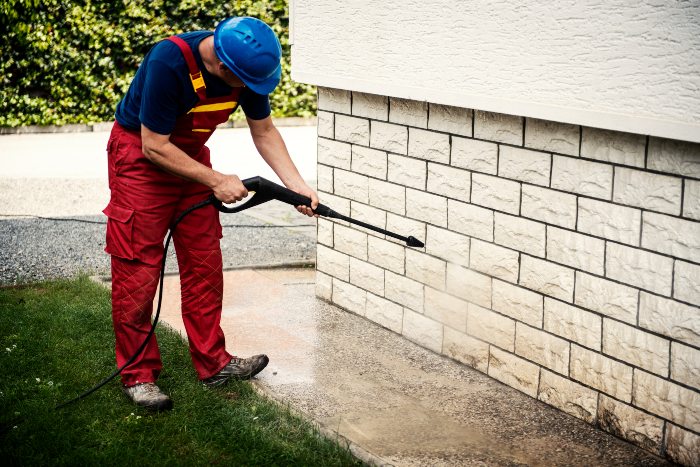Ways To Clean Masonry
If your home is made of brick, stone, or concrete, you will eventually notice a discoloring layer slowly building up on the exterior. Giving your home masonry a good cleaning is a regular part of home maintenance, important for both its appearance and structural health. Regular cleaning not only enhances the aesthetic appeal of your property but also helps in preserving the material from deterioration caused by accumulated dirt, grime, and biological growth like moss and algae. This maintenance can help you spot potential structural issues early, such as cracks or deteriorating mortar, which can prevent costly repairs in the future. Additionally, a clean masonry surface contributes to a healthier living environment by reducing mold and mildew, and it can also improve the overall value and longevity of your property.

How Do You Clean Masonry?
Cleaning masonry is a process that begins with an inspection to assess the type of material, its condition, and the extent of dirt or damage. Once the type of masonry and nature of the stains are understood, the appropriate cleaning method is selected. This involves preparing the area, protecting surrounding surfaces, and preparing the cleaning solutions and tools. The cleaning method, which can range from water to chemical or abrasive cleaning, is then applied. Following the cleaning, a thorough rinse of the masonry is necessary to remove any residual cleaning agents. Finally, you’ll need to inspect the work to identify any spots that might have been missed and performing necessary touch-ups.
Types of Masonry
Masonry comes in various types, each with its unique properties and cleaning requirements. Brick masonry is made from individual bricks and mortar, while stone masonry consists of natural stones. Concrete block masonry utilizes concrete blocks, and veneer masonry uses thin slices of bricks or stones primarily for aesthetic purposes. The cleaning techniques vary depending on these different types of masonry, making it crucial to identify the type before choosing a cleaning method.
How Do You Clean Stone and Masonry?
The process of cleaning stone and masonry involves several steps. It often starts with water cleaning, using low-pressure water to remove loose dirt. For surface grime, a mild detergent can be effective. In cases of deep-set stains, a poultice can be used to draw out the stain. Steam cleaning is particularly effective for biological growth, such as moss or algae, that may have formed on the masonry.
How Do Professionals Clean Bricks?
Professional brick cleaning typically involves a combination of methods. Pressure washing is a common technique, though it requires careful use of low to moderate pressure to avoid damaging the bricks. For tougher stains, professionals often turn to chemical cleaners specifically designed for brick surfaces. In extreme cases, sandblasting can be used for hard-to-remove stains, but this method is abrasive and must be used with caution to avoid damaging the bricks.
When to Use Water Cleaning on Masonry
Water cleaning is most suitable for situations where the dirt is superficial and can be easily removed. It is also a preferred method for regular preventive maintenance to prevent the accumulation of dirt. Water cleaning is particularly beneficial for softer types of masonry, where abrasive methods might cause damage.
When to Use Chemical Cleaners on Masonry
Chemical cleaners are recommended for tackling tough stains such as oil, graffiti, or rust. However, it’s important to first perform a spot test to ensure that the cleaner won’t damage the masonry. It is also important to follow the manufacturer’s instructions to make sure the cleaner is effective for the cleaning, and also to avoid causing harm to the environment.
When to Use Abrasive Cleaners on Masonry
Abrasive cleaning should be considered for stubborn stains that cannot be removed with milder methods. This method is suitable for harder types of masonry, like certain bricks and stones, which can withstand the abrasiveness. However, it’s important to use this method with caution as it can erode or damage the surface of the masonry.
If you need more advice about professional masonry cleaning, contact us today. At ROCK’N-IT Masonry, we specialize in top-notch masonry and home improvement services, proudly serving Weber, Davis, Salt Lake, and Utah Counties. Our team is renowned for their unrivaled craftsmanship in brick, rock, and stonework. We handle every project, from intricate new builds to precise repairs, with the finesse and dedication of true artists. Our approach ensures that each task, no matter how small, receives the expert attention of our highly skilled masons. We are committed to surpassing your expectations, offering quick response times, competitive pricing, and exceptional workmanship. Our focus is on quality, not speed, ensuring that every job is completed correctly. Trust us to enhance your home with superior work on mailboxes, fireplaces, interior and exterior brick & stone, chimney repairs, and the creation of beautiful outdoor living spaces, posts, fences, and fire-pits. Your satisfaction is our guarantee.
